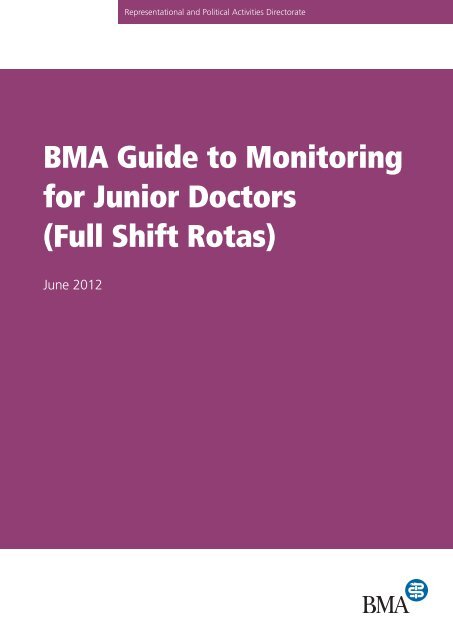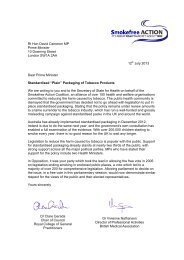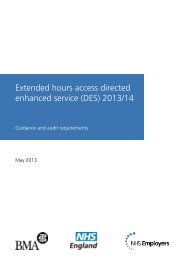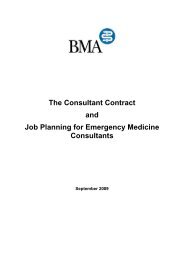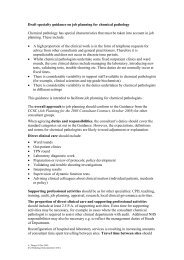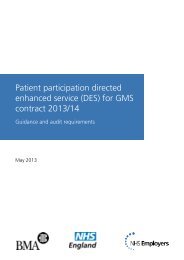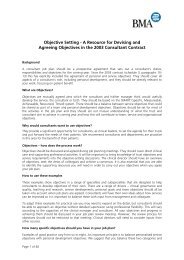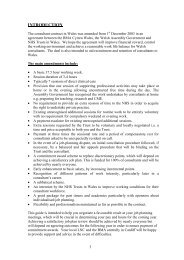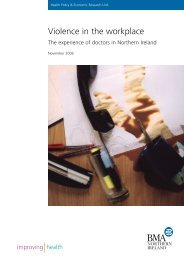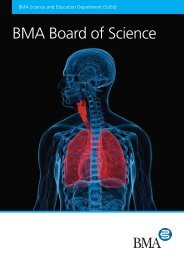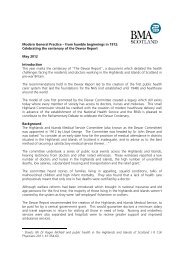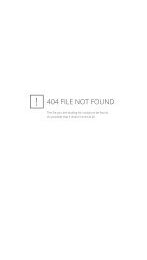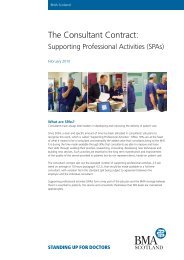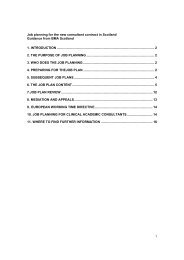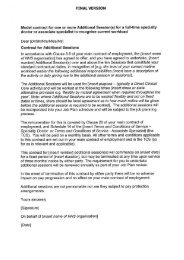ensure that your hours are monitored - BMA
ensure that your hours are monitored - BMA
ensure that your hours are monitored - BMA
You also want an ePaper? Increase the reach of your titles
YUMPU automatically turns print PDFs into web optimized ePapers that Google loves.
Representational and Political Activities Directorate<br />
<strong>BMA</strong> Guide to Monitoring<br />
for Junior Doctors<br />
(Full Shift Rotas)<br />
June 2012
Representational and Political Activities Directorate<br />
A <strong>BMA</strong> guidance note from Junior Doctors Committee Terms and Conditions & Negotiating<br />
Subcommittee.<br />
Authored by Dr Adam Moreton<br />
Contributing authors;<br />
Dr Andrew Collier<br />
Mr Benjamin Carrick<br />
Dr Darshan Brahmbhatt<br />
Dr David Farren<br />
Dr David Samuel<br />
Dr Eleanor Draeger<br />
Mr Tom Berry<br />
Dr Tom Dolphin<br />
Dr Tom Savage<br />
<strong>BMA</strong> Guide to Monitoring for Junior Doctors (Full Shift Rotas) 1
2<br />
Representational and Political Activities Directorate<br />
<strong>BMA</strong> Guide to Monitoring for Junior Doctors (Full Shift Rotas)
Representational and Political Activities Directorate<br />
<strong>BMA</strong> Guide to Monitoring for Junior<br />
Doctors (Full Shift Rotas)<br />
Your employer must <strong>ensure</strong> <strong>that</strong> you, as a junior doctor, can work safely and effectively without<br />
excessive workloads <strong>that</strong> might compromise patient c<strong>are</strong>. To facilitate this, they must <strong>ensure</strong> <strong>that</strong><br />
<strong>your</strong> actual working <strong>hours</strong> comply with the New Deal and the European Working Time Directive.<br />
The New Deal is <strong>your</strong> employment contract, (negotiated on <strong>your</strong> behalf by the <strong>BMA</strong>) it details working<br />
patterns and conditions for doctors in training and sets limits on <strong>hours</strong> and work intensity.<br />
The <strong>hours</strong> you work and the unsocial nature of a rota determines <strong>your</strong> pay banding, and whilst this<br />
can be calculated from a template rota, what actually happens and the true intensity of the work<br />
can only be established through monitoring (sometimes called diary carding).<br />
What is Monitoring?<br />
Monitoring usually takes place twice a year for two weeks. Effective and accurate monitoring of<br />
<strong>your</strong> <strong>hours</strong> and working patterns underpins any attempts to identify <strong>are</strong>as of concern, establish<br />
good working practices, and implement solutions. Monitoring is compulsory, and any falsification<br />
of <strong>hours</strong> monitoring (for the benefit of either you or <strong>your</strong> employer) is fraud.<br />
You <strong>are</strong> required to take part in monitoring even if you <strong>are</strong> on annual leave or study leave. It is<br />
important to note <strong>that</strong> in order for a monitoring exercise to be valid 75% of doctors need to fully<br />
participate and 75% of duty periods worked need to be <strong>monitored</strong>.<br />
When completing <strong>your</strong> monitoring diary cards remember <strong>that</strong> compulsory teaching should be recorded<br />
as work and not rest or part of a natural break (even if you can eat during the teaching).<br />
Some hospitals/employers have agreed policies <strong>that</strong> before a junior doctor can work late they <strong>are</strong><br />
required to seek the approval of their consultant. Often, the consultant is not around to provide such<br />
approval and the requirement for such a signature can put pressure on you to not record early starts<br />
and late finishes and undermines the monitoring exercise. Working late is often unavoidable and a<br />
consultant is not always around to provide such approval. In such circumstances, you <strong>are</strong> still required<br />
to record the late finish.<br />
No one should ask or be applying pressure on junior doctors to change their normal working pattern<br />
during a monitoring period, and to avoid any unintentional pressure being put on junior doctors it<br />
should not be a requirement <strong>that</strong> diary cards (or similar forms) need to be signed by a consultant in<br />
order to be validated.<br />
You may be asked to provide reasons for working beyond <strong>your</strong> <strong>hours</strong> or being unable to take a natural<br />
break. Although you <strong>are</strong> not obliged to state reasons for these occurrences it can help the analysis of<br />
<strong>your</strong> diary card if this information is provided, although it is not a requirement of monitoring.<br />
<strong>BMA</strong> Guide to Monitoring for Junior Doctors (Full Shift Rotas) 3
4<br />
Representational and Political Activities Directorate<br />
What is ‘rest’ and what is a ‘natural break’?<br />
A natural break is at least 30 minutes continuous break after approximately every 4 <strong>hours</strong> on duty,<br />
without an interruption requiring you to do something.<br />
In Scotland only, ‘approximately’ has been taken to mean <strong>that</strong> a ‘junior doctor should not work more<br />
than 5 <strong>hours</strong> without a break’: any work after <strong>that</strong> up to 9 <strong>hours</strong> attracts one natural break, work<br />
beyond 9 <strong>hours</strong> up to 13 <strong>hours</strong> requires a second natural break and between 13 and 14 <strong>hours</strong> work<br />
necessitates a third natural break (working over 14 <strong>hours</strong> continuously makes the rota non-compliant<br />
with <strong>your</strong> contract). In the rest of the UK ‘approximately’ has not been defined.<br />
A single one-hour break cannot count as two natural breaks and two 15-minute breaks cannot count<br />
as one natural break. Being bleeped during a natural break is acceptable unless the doctor has to act<br />
on the call, or the bleeping is repeated and disruptive. Under <strong>your</strong> contract (the New Deal), natural<br />
breaks count as work, and should not be recorded as rest.<br />
Rest is different from natural breaks, you usually do not get rest on a full-shift rota, and this is normal<br />
practice (as you get natural breaks instead). Rest is a term <strong>that</strong> applies to on-call and partial shift rotas.<br />
If you were not working, not in a meeting, not in teaching, not available and with <strong>your</strong> bleep off, then<br />
fill in <strong>that</strong> time as rest.<br />
Completing <strong>your</strong> monitoring<br />
Monitoring originally required junior doctors to complete paper diary cards <strong>that</strong> were manually<br />
analysed. Online monitoring is now becoming more common and we will first tell you how to use the<br />
two systems used by most employers: DRS and Zircadian.<br />
It is important to fill <strong>your</strong> diary in as contemporaneously as possible, as it can be difficult to remember<br />
how many <strong>hours</strong> you were at work for and whether you got all of <strong>your</strong> breaks if you try to fill in all 14<br />
days after the monitoring period has ended. We would recommend <strong>that</strong> if you cannot get ready<br />
access to a computer to fill in <strong>your</strong> online monitoring on the day <strong>that</strong> you keep a note of the <strong>hours</strong><br />
<strong>your</strong> worked (and any breaks) on paper so <strong>that</strong> you can enter them accurately at a later date.<br />
Monitoring using the Doctors Rostering System (DRS)<br />
Before the monitoring period begins you should receive an email from <strong>your</strong> Human Resources<br />
department giving you <strong>your</strong> login details and the address for the DRS website<br />
(http://www.drsuser.nhs.uk).<br />
<strong>BMA</strong> Guide to Monitoring for Junior Doctors (Full Shift Rotas)
Representational and Political Activities Directorate<br />
Completing the DRS diary card:<br />
1. Log in and on the diary card select the correct day type for the shift as per <strong>your</strong> rota.<br />
2. Amend the start and end time if they differ from the actual <strong>hours</strong> you worked.<br />
3. Enter any time spent as rest. Remember <strong>that</strong> natural breaks and teaching <strong>are</strong> classed as work,<br />
not rest. See earlier in this guide for a fuller definition of rest.<br />
4. Leave the Res? box ticked if you were onsite/resident for the shift.<br />
5. The natural break (nb) box is automatically ticked as the softw<strong>are</strong> assumes <strong>that</strong> you achieved all<br />
of <strong>your</strong> natural breaks for the shift. Untick this box if you did not get adequate natural breaks<br />
(30 continuous minutes after approximately 4 <strong>hours</strong> continuous work). If you were unable to take<br />
all of <strong>your</strong> natural breaks in a shift then untick the box.<br />
6. Click save after completing the entry for each day.<br />
7. If you had to work extra <strong>hours</strong> or were unable to get <strong>your</strong> natural breaks then it would be helpful<br />
if you would provide a reason in the notes section. Remember to click save notes before closing<br />
the window.<br />
8. If you have swapped a shift then it would help facilitate the monitoring analysis if you state who<br />
you swapped with (make sure <strong>that</strong> you swap any zero hour/rest days <strong>that</strong> come with any<br />
exchanged on-call shifts).<br />
All <strong>hours</strong> worked during monitoring should be recorded if the doctor is not able to leave on time due<br />
to c<strong>are</strong> of a patient/compulsory teaching. If you choose to remain at work, perhaps to gain extra<br />
training, then this time should not be recorded on the monitoring diary.<br />
Monitoring using softw<strong>are</strong> by Zircadian<br />
Before the monitoring period begins you should receive an email from <strong>your</strong> HR department giving you<br />
<strong>your</strong> login details and the address for the Zircadian monitoring website<br />
(http://www.juniordrportal.co.uk/) where you will enter details of <strong>your</strong> work.<br />
Completing the Zircadian diary card:<br />
1. Green blocks indicate work: Your day is represented as a series of squ<strong>are</strong>s representing 15<br />
minutes. Uncoloured blocks do not count towards <strong>your</strong> <strong>hours</strong> worked and <strong>are</strong> counted as rest<br />
(compulsory teaching counts as work and coloured green, full shift rotas often do not contain rest.<br />
See earlier in this guide for a fuller definition of rest).<br />
2. Recording Natural Breaks: The natural break box is automatically ticked below the work<br />
episode as the softw<strong>are</strong> assumes <strong>that</strong> you achieved all of <strong>your</strong> natural breaks for the shift. Untick<br />
this box if you did not get adequate natural breaks (30 continuous minutes after approximately<br />
4 <strong>hours</strong> continuous work). If you were unable to take all of <strong>your</strong> natural breaks in a shift then<br />
untick the box.<br />
<strong>BMA</strong> Guide to Monitoring for Junior Doctors (Full Shift Rotas) 5
6<br />
Representational and Political Activities Directorate<br />
You will need to record the periods in which you took <strong>your</strong> natural breaks using the work<br />
activity labelled ‘natural breaks’. Where this is not available colour the boxes as green to<br />
record the time as ‘work’. Only additional rest taken over and above natural breaks should<br />
be uncoloured.<br />
3. Start and Finish Times: If you need to change <strong>your</strong> <strong>hours</strong> of work beyond <strong>that</strong> shown on <strong>your</strong><br />
rota use the drop-down menu to the right of the diary squ<strong>are</strong>s (click to shade it green if you<br />
worked during <strong>that</strong> time). Whenever you enter a start or finish time <strong>that</strong> extends <strong>your</strong> shift you<br />
will be prompted to enter a reason. We would advise you to enter a reason to justify the extra<br />
time spent at work (such as a ward round starting early/finishing late). All <strong>hours</strong> worked during<br />
monitoring should be recorded if the doctor is not able to leave on time due to c<strong>are</strong> of a<br />
patient/compulsory teaching. If you choose to remain at work, perhaps to gain extra training,<br />
then this time should not be recorded on the monitoring diary.<br />
Monitoring using Paper Diary Cards<br />
Some employers still require you to fill out paper diary cards. These can be in any format, but the<br />
<strong>BMA</strong> does have a suggested template <strong>that</strong> can be used.<br />
Ensure <strong>that</strong> you have entered all the time <strong>that</strong> you spent at work onto the diary card.<br />
Where there is a space left for notes ( to explain, for example why a shift finished late) it is helpful to<br />
make a note accordingly.<br />
If a consultant signature is called for and no consultant is available to sign the form (because of the<br />
lateness of the hour for example) then write a note as such.<br />
When the diary card exercise is over photocopy <strong>your</strong> forms and keep them as a record in case of any<br />
dispute later.<br />
FAQs<br />
Do I have to fill out entries for days I am on annual leave/study leave/sick leave/rest or<br />
zero <strong>hours</strong> days?<br />
Yes, it is really important <strong>that</strong> junior doctors fill in entries for each day of the monitoring period.<br />
This includes days when you <strong>are</strong> not on site. For monitoring exercises to be valid there needs to be<br />
a total doctor return rate of 75% and a duty return rate of 75% for all shifts worked. It is very easy<br />
to miss these targets and when this happens the whole monitoring period has to be repeated.<br />
When you <strong>are</strong> on annual leave, study leave, sick leave or a rest day simply select the appropriate<br />
‘day type’ from the list on the monitoring diary.<br />
<strong>BMA</strong> Guide to Monitoring for Junior Doctors (Full Shift Rotas)
Representational and Political Activities Directorate<br />
Do I have to enter a reason for working beyond my <strong>hours</strong>/being unable to take a break?<br />
Neither <strong>your</strong> contract (the National Terms and Conditions), nor guidance on monitoring from the<br />
Department of Health or the devolved administrations states <strong>that</strong> you <strong>are</strong> obliged to provide reasons<br />
for working additional <strong>hours</strong> or being unable to take a break – only <strong>that</strong> you record these truthfully.<br />
If you provide reasons for not being able to keep to the template rota it often helps analysis of <strong>your</strong><br />
diary card entries and can help facilitate a re-design of troublesome rotas. Information <strong>that</strong> would be<br />
helpful for the employer to know includes the timing of ward rounds <strong>that</strong> mean you need to come in<br />
early or stay late, or a high intensity/high urgency of work meaning breaks couldn’t be taken.<br />
Does a consultant have to sign my monitoring diary?<br />
Neither <strong>your</strong> contract (the National Terms of Conditions), nor guidance on monitoring from the<br />
Department of Health or the devolved administrations states <strong>that</strong> diary cards should or must be signed<br />
by a consultant in order to be validated. (NB Consultant signatures <strong>are</strong> still required in Northern Ireland.)<br />
In Scotland, obtaining a consultant signature can be used as part of an agreed (with the LNC) local<br />
monitoring procedure. However, the absence of a consultant signature does not entitle the employer<br />
to discount, or invalidate, the form. If used, the consultant sign-off for breaches should be a<br />
requirement at all times, and not just during monitoring.<br />
No one should ask or be applying pressure on junior doctors to change their normal working pattern<br />
during a monitoring period, and to avoid any unintentional pressure being applied it should not be a<br />
requirement for diary cards (or similar forms) to be signed by a consultant.<br />
If a consultant refuses or is unavailable to sign the form, then you should submit the form unsigned<br />
with the correct <strong>hours</strong> on and an explanation as to why the form is unsigned. This will make it easier<br />
to challenge the monitoring results should this prove necessary, and will help to <strong>ensure</strong> <strong>that</strong> the trust<br />
cannot simply ignore forms as unsigned.<br />
If you <strong>are</strong> pressurised to falsify <strong>your</strong> <strong>hours</strong>, or you feel <strong>that</strong> <strong>your</strong> trust is not following the rules set out<br />
in this paper, contact a <strong>BMA</strong> advisor by calling 0300 123 123 3 or emailing support@bma.org.uk.<br />
<strong>BMA</strong> Guide to Monitoring for Junior Doctors (Full Shift Rotas) 7
8<br />
Representational and Political Activities Directorate<br />
How do I find out the results of the monitoring?<br />
The results of the monitoring should be provided to you within 15 working days of completion. This<br />
summary report should be easy to understand and give information about natural breaks and <strong>hours</strong><br />
and an assessment against New Deal requirements and pay banding criteria.<br />
The purpose of monitoring is not to assess whether a rota is compliant in principle (on paper), but<br />
rather whether it is compliant in practice. Monitoring entries should be an accurate representation of<br />
<strong>your</strong> work and you should not be subject to any pressure to alter this in any way. If you <strong>are</strong> put under<br />
pressure to alter <strong>your</strong> monitoring results, this could be construed as bullying and/or harassment.<br />
What do I do with the results of the monitoring?<br />
Well designed rotas should mean <strong>that</strong> the template rota is representative of the day-to-day working<br />
practices of the doctors on it.<br />
Where the monitoring outcome banding and the template banding <strong>are</strong> the same then there is nothing<br />
<strong>that</strong> needs to be done and the rota will continue to be <strong>monitored</strong> every six months (this can be yearly<br />
where all parties agree the rota has consistently and clearly been shown to be New Deal compliant<br />
and the pay banding is clear and unlikely to change).<br />
If there is a discrepancy between the banding shown by monitoring and <strong>that</strong> of the template rota then<br />
you should either contact HR to discuss this (where you feel confident to raise any issues), or contact<br />
a <strong>BMA</strong> adviser by calling 0300 123 123 3 or email support@bma.org.uk for advice. Where an<br />
agreement over the banding of a rota cannot be reached then appeal mechanisms exist to resolve this.<br />
The <strong>BMA</strong> Junior Doctors Committee hopes <strong>that</strong> this guide proves useful and if you have any questions<br />
or issues regarding completing monitoring , obtaining the results, or actioning the outcome then<br />
contact a <strong>BMA</strong> adviser by calling 0300 123 1233 (lines open 08:30 – 18:00 Monday to Friday<br />
excluding UK Bank Holidays. Calls cost the same as geographic numbers starting 01 or 02) or by<br />
emailing support@bma.org.uk.<br />
<strong>BMA</strong> Guide to Monitoring for Junior Doctors (Full Shift Rotas)


